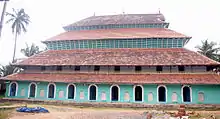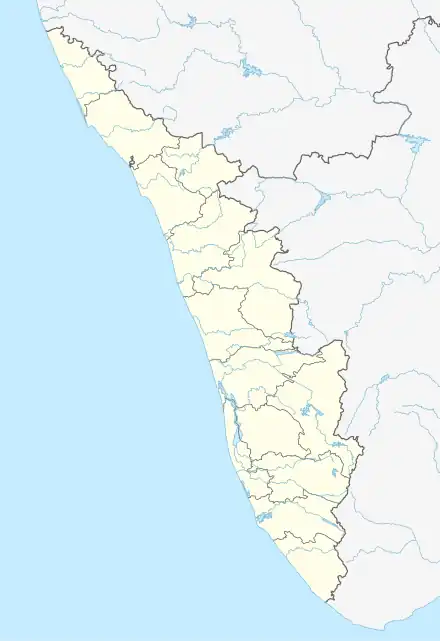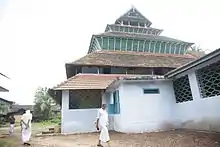| Mishkāl Mosque | |
|---|---|
Mishkāl Palli | |
 View of Mishkāl Mosque from one of its entrances | |
| Religion | |
| Affiliation | Islam |
| Branch/tradition | Islam (Sunni - Šāfiʿī) |
| Location | |
| Location | Kuttichira, Calicut, present-day India |
 Location in present-day Kerala | |
| Geographic coordinates | 11°15′N 75°46′E / 11.25°N 75.77°E |
| Architecture | |
| Type | mosque |
| Style | Regional (Kerala) |
| Date established | 14th century (present structure) |
| Specifications | |
| Dome(s) | 0 |
| Minaret(s) | 0 |
Mishkal Mosque (Malayalam: മിശ്കാൽ പള്ളി, also spelled Mithqal Mosque[1]) is a medieval mosque located in Calicut on Malabar Coast, southern India. The mosque, one of the few surviving medieval mosques in Kerala, is regarded as an important cultural, historical and architectural monument of Kerala.
The mosque was built by the eponymous Muslim merchant-shipowner (nakhuda) in the 14th century.[2][1] Mishkal - active in Calicut in the 1340s - possessed "great wealth" and a fleet of ships for "the trade with India, China, Yemen, and Persia".[3] Ship-owners known as the nakhudas were among the wealthiest merchants of medieval Indian Ocean world.[3]
Mishkal Mosque is located in Kuttichira neighbourhood, a part of Thekkepuram beach in Calicut.

In January 1510,the mosque was partially burned in a Portuguese attack on Calicut by Albuquerque which also occupied the Zamorin's palace.The attack was later repulsed by the Zamorin's Nair troops with 300 to 500 Portuguese killed and the remaining barely even surviving.[4] The top floors of the mosque still display some of that damage.[2][5]
The shattered mosque was later renovated and refurbished under Zamorin's supervision. He used to offer land and grant permission for the Muslims to construct worship places or mosques wherever intended. The Muchundi Mosque in Kuttichira till date holds inscriptions on stone that shows his financial contribution towards its construction in the thirteenth century.
Mishkal Mosque originally had five stories. It was rebuilt in 1578/79[1] after the 1510 arson and now has four stories.[2] Typical for similar medieval mosques in Kerala, it has no cupolas and minarets and heavily employs timber.

A large tank known as the Kuttichira tank is attached to the mosque. The mosque has 47 doors, 24 carved pillars and a big prayer hall that can accommodate around 400 people. The prayer hall is well ventilated and there is a wooden member with intricate motifs.
References
- 1 2 3 Prange, Sebastian. ''Monsoon Islam: Trade and Faith on the Medieval Malabar Coast". Cambridge University Press, 2018. 78-81. 135-36.
- 1 2 3 "Mishkal Mosque at Kuttichira". Archived from the original on 26 April 2009. Retrieved 3 November 2009.
- 1 2 Prange, Sebastian. ''Monsoon Islam: Trade and Faith on the Medieval Malabar Coast". Cambridge University Press, 2018. 78- 81.
- ↑ Dale, Stephen Frederick (ed.), "Portuguese attack on Calicut", Islamic Society in the South Asian Frontier
- ↑ "Mishkal Mosque". Archived from the original on 29 September 2008. Retrieved 3 November 2009.
{{cite web}}: CS1 maint: unfit URL (link)
External links